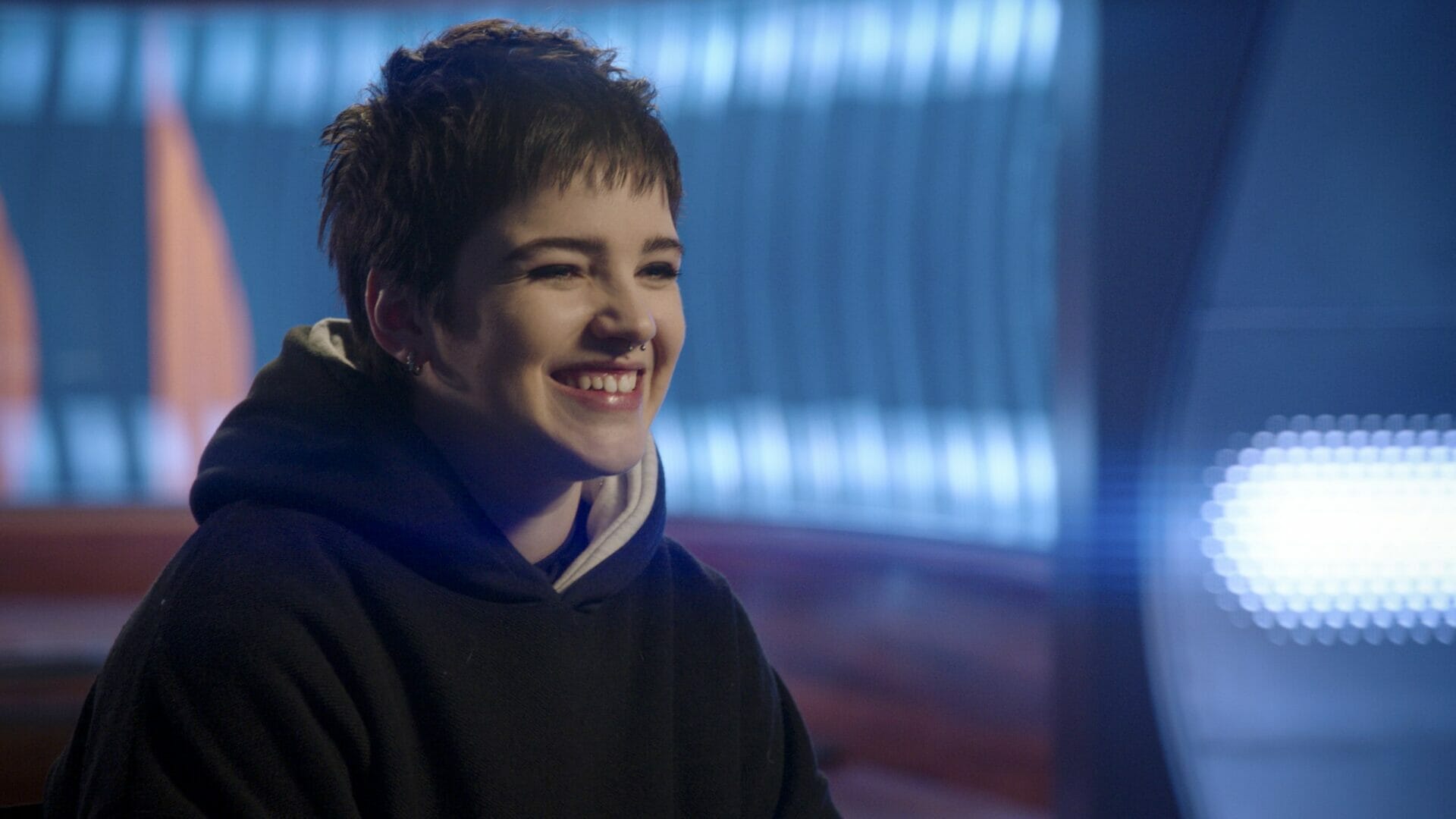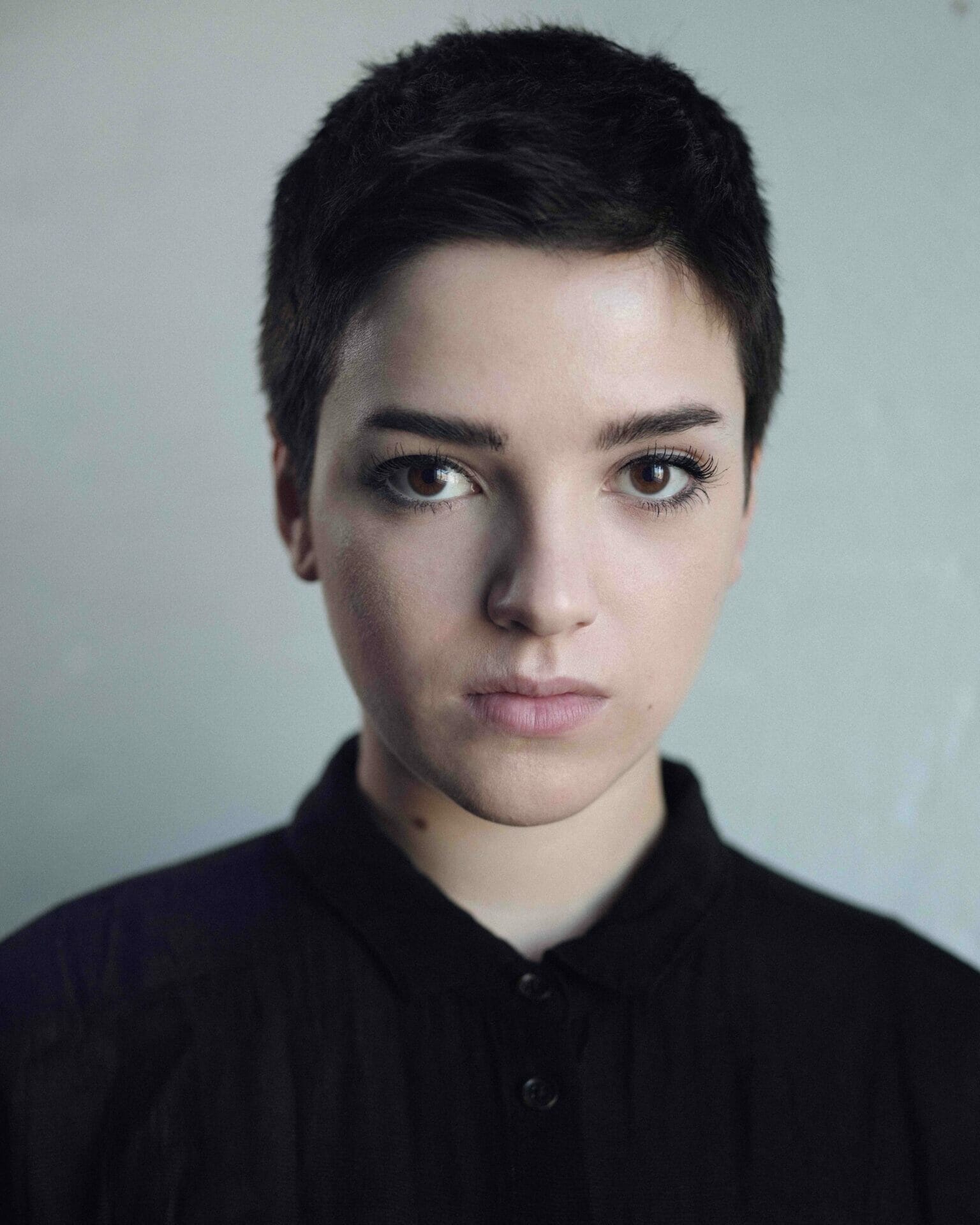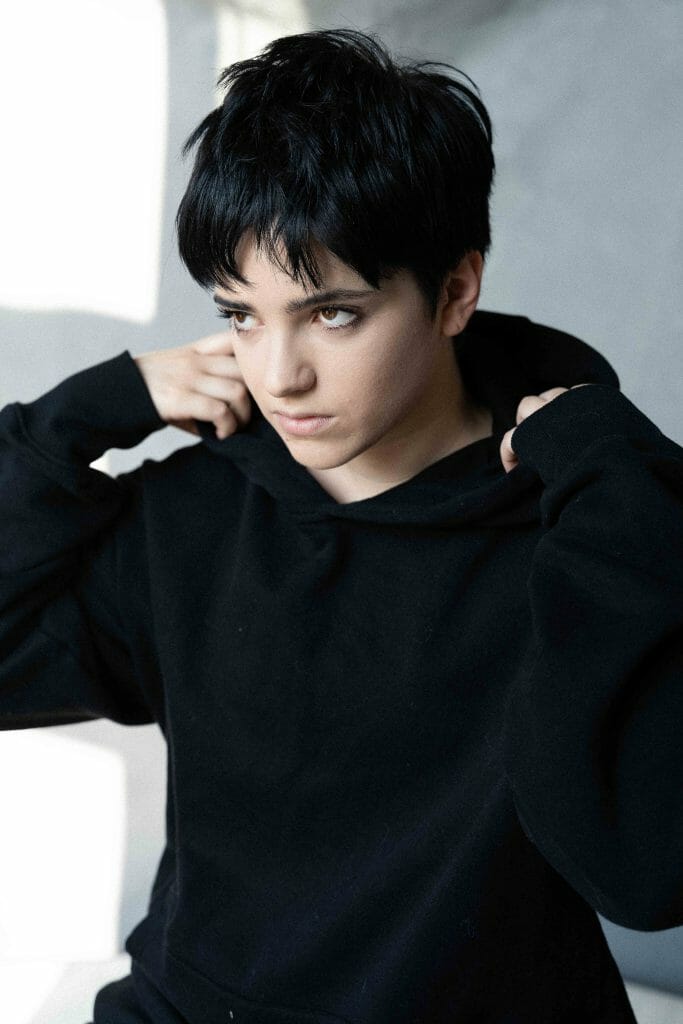Today, Star Trek: Discovery announced that season three will introduce the first non-binary and transgender characters in the history of the Star Trek franchise. The non-binary character, Adira, is played by Blu del Barrio, while the trans character, Gray, is played by out trans actor Ian Alexander. Alexander is well-known for his roles on Netflix’s The OA and as Lev in The Last of Us Part II. But this will be the first time people meet the talented actor Blu del Barrio. So we sat down with Blu to find out a little bit more about their life and how they landed the role of Adira.
Hi Blu! We met last year, right after you got cast as Adira, and I’m so happy that I get to chat with you about the show! Star Trek: Discovery is your first major acting gig. How did you find out about the casting call for this role?
Hi Nick, I’m excited to finally get to talk about everything! I was just finishing my final year of drama school in the UK when my agent sent me the casting call for Adira. I loved the idea for the character, taped for it, and later during rehearsals for my last show, got the call that I’d booked the part. A few weeks later, I flew directly to Toronto and walked onto the set. It all happened pretty quickly and felt very surreal. I feel incredibly lucky to be a part of this show.
Star Trek news is always kept under wraps to avoid spoilers, but what (if anything) can you tell us about the character you play?
I will try and say anything I can! Adira is a wonderfully complex character. Mainly because of this duality they have within them: they’re astonishingly intelligent and yet they’re still a kid. They experience their emotions at a heightened level, like most teenagers. That’s what makes them so fun to play. I like to describe them as cerebrally brilliant and emotionally a puppy. Adira is an introvert, but they keep a few people close to the chest, which I definitely resonate with. I don’t want to say too much and get in trouble, but all in all, Adira is a uniquely strange and beautiful character.
And you are joining the show alongside Ian Alexander, who is playing a Trill character named Gray. What was it like working with Ian, and was it nice to have another actor join the show with you at the same time?
I honestly cannot speak highly enough of Ian. I absolutely love him, and it was so fun working alongside him. Having him join the show with me was a godsend. It’s pretty overwhelming joining a show with such a well-known cast going into its third season. So I was so thankful to have his support whenever I was freaking out. He’s a talented, hardworking actor, and an all-around magnificent human being, so it was a joy having him as a partner.
 I understand that Adira doesn’t tell the crew of the Discovery about being non-binary immediately. Can you give us some insight as to why they don’t reveal their gender until later?
I understand that Adira doesn’t tell the crew of the Discovery about being non-binary immediately. Can you give us some insight as to why they don’t reveal their gender until later?
When we meet Adira, they’re suffering from memory loss. They remember nothing from their past, and very little about themself. They know they’re non-binary, of course, but coming onto Discovery they’re cautious about sharing that information with anyone. They’re a private person, so they aren’t going to divulge a lot about themselves to a ship full of strangers. It’s not until Adira has found a place of comfort with Stamets and Culber that they feel they can talk about who they are. When I got the call that I’d been cast as Adira, I hadn’t yet told the majority of my friends and family that I was non-binary. I had only recently discovered the word and realized that it described how I’d felt for a long time. I knew I wanted to tell my friends and family, so when this happened, it felt like the universe saying “go ahead.” So in a way, Adira’s story ends up mirroring mine. Just after I told people in my life, so did Adira. Definitely not the most common coming out story, but it was scary, special, and life changing (as they usually are).
You are also non-binary. Why is it important to you to talk about being non-binary right now? And what pronouns do you use?
I want to start by saying that non-binary people have always existed. People’s immediate response is often that they’ve never heard the word non-binary, and therefore question it’s validity. Most people don’t personally know someone who is transgender, so they don’t know much about gender diversity. This is where I believe the problem starts – the problem that leads to discrimination and violence against trans people. Our education system in the US is severely lacking LGBTQ+ subject matters in the curriculum, as well as resources for LGBTQ+ youth. I knew I was different at eight years old, but there wasn’t one person who knew how to help me. I was struggling with terrible dysphoria, and every single day I wished someone would understand and help me. No one ever did. That led me to change everything about myself so I could survive, but it would have been so much better if my gender had been affirmed by those around me. Many trans kids don’t make it. This is not something we can put on a to-do list. It requires immediate action. Forty percent of trans people attempt suicide, compared to 4.6% of the general population. If that doesn’t scream urgency, I don’t know what does. I honestly believe if schools were legally required to include LGBTQ+ curriculum, we would see a huge change in how our country treats trans people. But until then, using our own voices, loudly, is the best we can do. So to answer your question, it’s not only important that we’re talking about our experiences, it’s necessary. People need to know who we are and be able to empathize with us in order for change to take place. Sorry for the rant, I could go on about this for hours. Regarding my pronouns, I use they/them/theirs. For those who find these pronouns difficult to get used to – I promise you – if my Argentinian parents can do it, so can you.
Many people are still confused about what it means to have a non-binary gender identity. What would you like people to know and understand about what being non-binary means for you?
It took me a very long time to find a word that could help me understand my gender, and honestly I am still figuring out who I am. This is because we live in a society built around a binary. Everything, and I mean everything, is gendered. It’s either made for men, or made for women. Non-binary is an umbrella term for any identity that does not neatly fit into that binary. So as you can imagine, if you are non-binary, navigating everyday life in this world can be extremely challenging. You are constantly invalidated and made to feel as if you don’t “fit.” What I want people to understand is that we do “fit,” but not into the strict gender binary our society has created. For many non-binary people, myself included, finding the language to match what you feel can be very difficult. I didn’t know the term existed until I was 21, but when I found it, my whole life suddenly made sense. The way we think and talk about gender has to change. Our societal norms surrounding gender have to change. Because non-binary people deserve to live in a world where they fit.
Telling the world about your gender identity can be challenging. Do you have any positive experiences you can share about how people have reacted to you telling them you are non-binary?
I had told a few friends in London before I got the part of Adira and they were very supportive, but I was absolutely terrified to tell dozens of total strangers when I started filming Star Trek in Canada. I was surrounded by a huge cast and crew of people I’d basically just met. But when I did tell people, I was stunned to find that this massive group of strangers wholeheartedly accepted and validated me. They welcomed me in with open arms. When I looked like I needed help, someone would go out of their way to help me. If someone had a question about my identity, they asked it thoughtfully and kindly. When I went to our costume department and sheepishly asked them if I could use a binder under my costumes, they went and MADE me one. I know this isn’t how it would go on every set, but it was clear that on the Discovery set, the producers, directors, writers, cast, and crew were equally committed to writing these wonderful characters in Adira and Gray, and creating a safe and healthy work environment for me and Ian. Hopefully in the future, every film and television set will be like this.
Are there other non-binary actors working in Hollywood that you look to as possibility models for your career?
Oh absolutely! I realized I might be non-binary the first time I saw a non-binary actor on television. (It was Lachlan Watson by the way, so they’re definitely on the list). Apart from Lachlan, I’m watching Indya Moore, Bex Taylor-Klaus, Theo Germaine, Asia Kate Dillon, and Brigette Lundy-Paine. I’m a huge fan of all of theirs. There’s not many of us (yet) in the industry, but I’m so grateful to have a few role models like them.
What would be your dream role in the future?
Literally any role in any Tim Burton film. He could honestly cast me as goblin #7 and I would die happy. I was raised on Tim Burton films, and his work has played a huge part in my artistic growth, so to be in any film of his would be a dream. Aside from that, my goal is to work in independent films. From films my friends make, to films on a tiny budget, to films that maybe no one ever hears about. I love working in small, tight knit groups and being a part of the collaboration. Some of the most special films I’ve seen have been independent and started out really small, so I’d love to work in that side of the industry.
Check out the new season of Star Trek: Discovery on CBS All Access on October 15!













